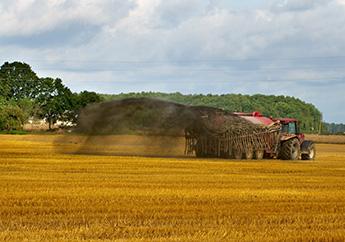
Land application of wastewater and wastewater treatment residuals involves spreading, injecting or incorporating the wastewater and residuals into the soil. When managed correctly, organic byproducts from wastewater and wastewater treatment residuals associated with food production may have agronomic value as fertilizers and soil amendments, with minimal contaminants. Land application is an excellent way to recycle wastewater and wastewater residuals as long as the material is quality-controlled.
The Missouri Department of Natural Resources allows organic byproducts from wastewater and wastewater management to be used in agricultural applications, similar to traditional, commercially available fertilizers and products. Fertilizers are regularly used on agricultural fields to promote growth and crop production. Fertilizers add vital nutrients to the soil, including nitrogen, phosphorus, potassium, calcium, magnesium, sulfur, boron, chlorine, cobalt, copper, iron, manganese, molybdenum, sodium and zinc. By using wastewater and wastewater treatment residuals, it removes the nutrients from these materials, reduces energy consumption, reduces pollution from manufacturing commercial chemical fertilizers and saves landfill space. Benefits of proper land application of wastewater and wastewater treatment residuals includes the following:
- Ensures nutrient management through agricultural practices
- Establishes practices to avoid exceeding hydraulic (water) loading rates and runoff
- Prohibits application of pollutants not mitigated through the agricultural management (e.g. metals)
For information about domestic biosolids, please visit EPA’s Basic Information about Biosolids webpage.
Notice
The department has begun the rulemaking process to update 10 CSR 20-2.010 and 20-6.015. If you are interested in following the rulemaking process, information is available at Clean Water Rulemaking.
